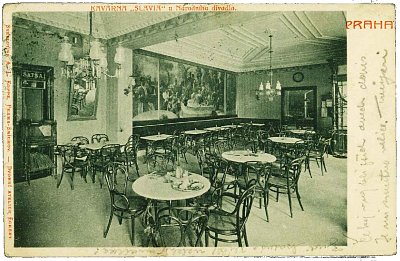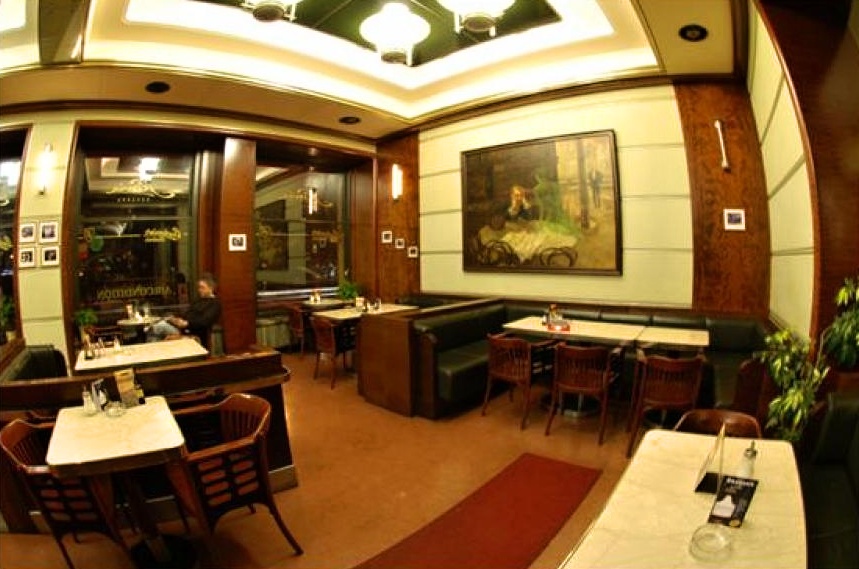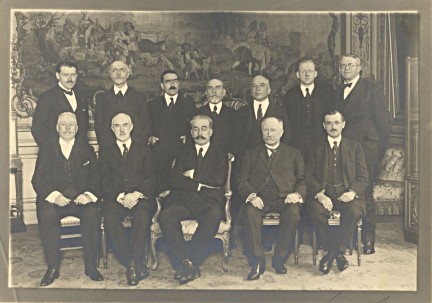The National Committee of International Chamber of Commerce in the Czech Republic has launched the Working group that shall support the use of mediation in the Central European region. Will it succeed?
Promoting Mediation at Art Deco Café
Once deciding to promote mediation, one cannot stand still. Despite the fact it is not obvious at the first sight, there are plenty of opportunities how to do it. 
One of them occurred when I met with Karel Machotka, the Executive Director of the National Committee of International Chamber of Commerce in the Czech Republic and with Milos Olik, a partner at ROWAN LEGAL Law firm who is known for his expertise in alternative dispute resolution. We spent together fruitful hours of discussions regarding the possibilities to bolster up the use of ADR in both domestic and international business in Central Europe.
Finally, we agreed to establish the working group under the auspices of the ICC Czech Republic that would create a place where to discuss the ideas, projects and opinions concerning mediation – a kind of ADR hub. That time, we did not know how much work and effort this assignment will require. Yet, after the hours of persuasion, some administrative work and other persuasion, we finally got the green light when the executive board of the ICC Czech Republic agreed on the Working group creation. One spring day, we met at glamorous Café Slavia in Prague to organize and prepare the first official session.
The venue of this preparatory meeting was not chosen randomly. Cafe Slavia has been offering a cup of coffee in an unforgettable atmosphere since 1884 and has witnessed the visit of many famous personalities, such as Karel Capek, the famous Czech novelist and author of the word “robot”, Vaclav Havel, the former Czech president, and Jaroslav Seifert, the Nobel Prize laureate for literature. When you step inside this wonderful place with the original Tonet chairs, the dark wood tables and the green marble walls, it almost feels as if you were taking a step back in time. The interior evokes the long-gone glamorous era of the 1920s. At the time, Prague was a cultural and political hub where many important ideas came into the world. By coincidence, it was the same era, when the International Chamber of Commerce was founded in Paris.

The Merchants of Peace
The goal of the ICC has been fittingly expressed in its Constitution: “to further the development of an open world economy with the firm conviction that international commercial exchanges are conducive to both greater global prosperity and peace among nations.” Indeed, it would be very difficult to find a partner more apt for working together to promote mediation in business than the ICC. Not only because it is by far the biggest organization of its kind in the world, but also because of its mission and history.
Its origins track back to 1919. Surprisingly, it was not the governments of the states, but the private sector that started filling the gaps that presented the biggest barriers to revived international trade in the devastated post-war world. A group of entrepreneurs who called themselves “the merchants of peace” decided to create an organization that would represent business worldwide.
The goal of this international structure was to provide the businessmen from all the parts of the world with the system of rules to govern trade, investment, finance or commercial relations.
Obviously, the founders did not realize that they were creating an organization that would become essential to the global economy. And this is exactly what happened: Today’s ICC has taken a central role in international business by issuing international rules, mechanisms and standards that are used on every day basis by thousands of businessmen. The ICC counts hundreds of thousands of member companies in more than 120 countries including many of the world’s biggest multinationals. The ICC experts engage in many different fields of business activity: From banking techniques to taxation, from competition law to intellectual property rights, telecommunications and information technology, from transport, environment and energy to international investment and trade policy. Last but not least, one of the main issues that concern the ICC is dispute resolution throughout arbitration and mediation.
The Mediation Think Tank
After our meeting in the Café Slavia, we addressed the members of the ICC Czech Republic to nominate their representatives to the working group. To our agreeable surprise, our call met with great interests. Finally, eleven representatives were recruited not only from the leading Czech law firms, but also from the Faculty of Law of the Charles University in Prague and from the leading Czech companies, such as ČEZ – the largest utility and biggest public company in Central and Eastern Europe – and as Česká spořitelna – the biggest bank in the Czech Republic. I was honoured to become the secretary to the Working group.
The initial session took place on Wednesday, the 17th of June 2015 at the ICC Czech Republic headquarter. We have soon realized that we have summoned together a group of people with similar opinions and concerns. Thus, the main purpose of the meeting, to create a sort of Mediation Think Tank was fulfilled straightaway.

In the end of the day, three main tasks have been approved to be carried on in coming months. All of them are following the one same purpose: To promote mediation among the leading economic subjects in the Czech Republic and Central Europe.
- The first task is to organize free mediation seminars that will make an introduction to the law departments and managers of those leading companies. Target group are foremost the members of the ICC Czech Republic, yet the future may show that it will be worthy to overstep those limits.
- The second task will be issuing a book in Czech that will make the readers familiar with the advantages of mediation and will introduce the ICC Mediation Rules to the broader public. We hope to finish the publication in autumn 2015.
- Last, but not least, the Working group has started drafting the text of the Mediation pledge. It will be a public statement in which corporations and law firms will declare to adopt a systemic approach to dispute resolution with more focus on mediation and other ADR. Similar programs have been very popular in the USA and in the United Kingdom. We will see whether it will meet similar success here in Prague.
I am sure I will inform you about this activity in some further post.
________________________
To make sure you do not miss out on regular updates from the Kluwer Mediation Blog, please subscribe here.



